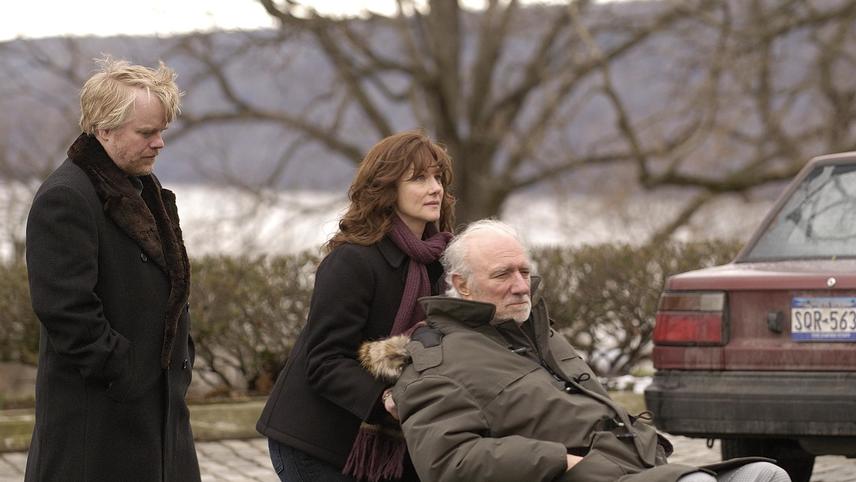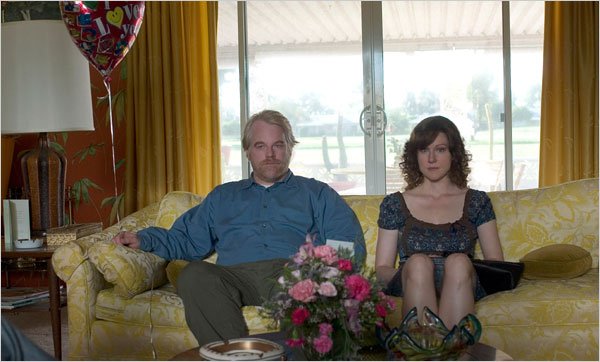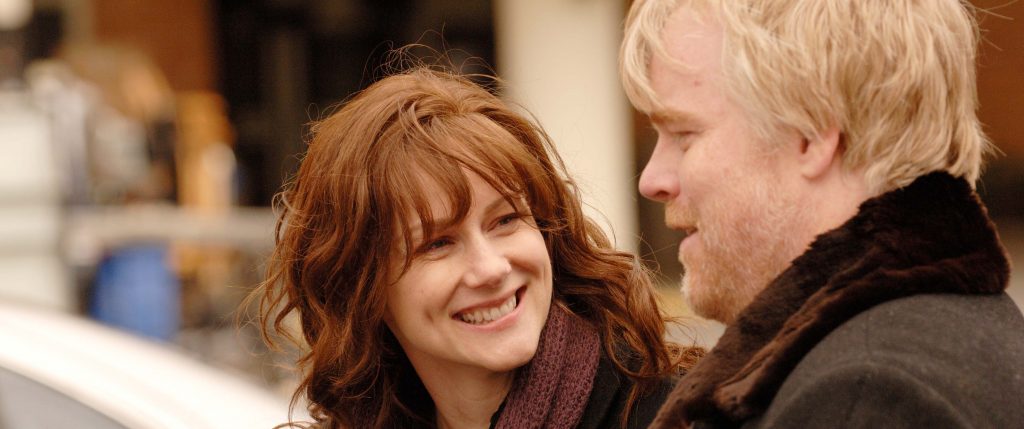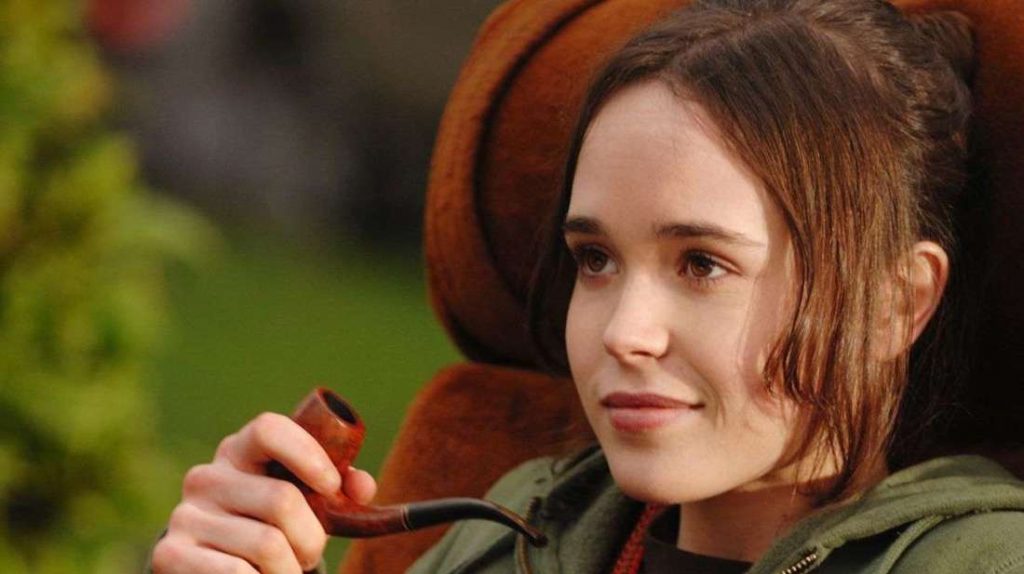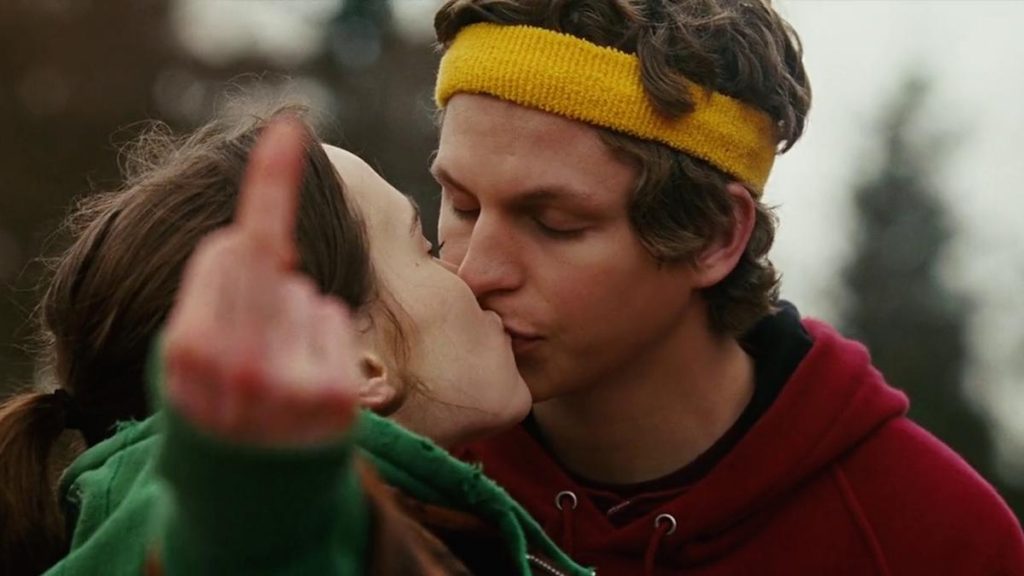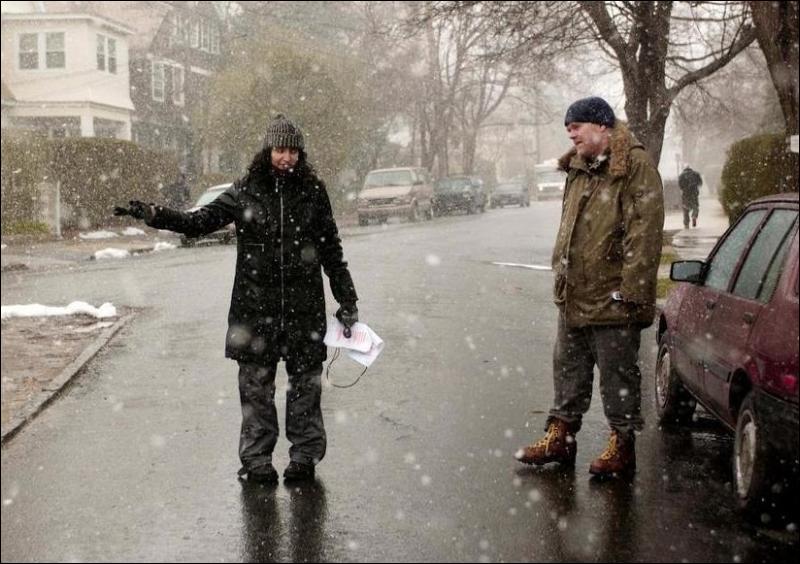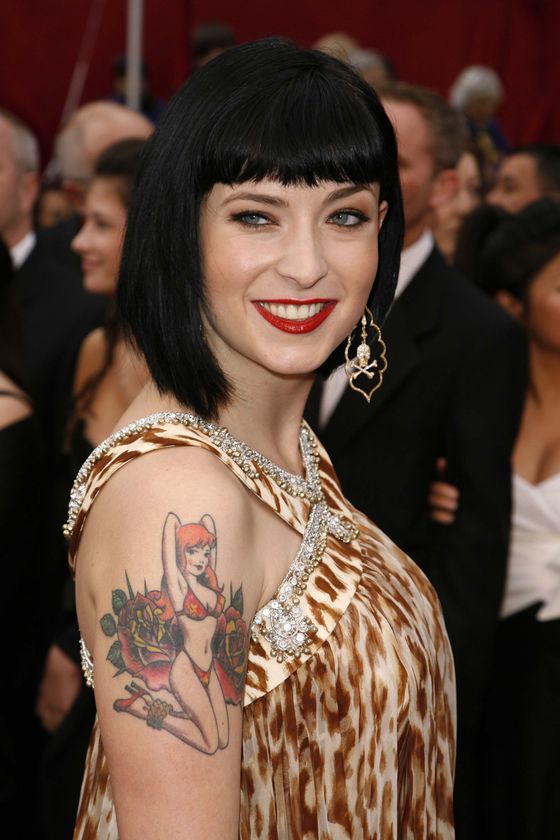Alex writes about The Savages, Tamara Jenkins, Laura Linney, and Diablo Cody.
“What is happening?” –Diablo Cody, beginning her acceptance speech for Best Original Screenplay
This premise is flawed before it’s revealed. It’s a wandering question brought on by nothing in particular outside of my own continued existence. The question first arose in the early parts of the 2008 calendar, a much more valid time for it to be posed. Nobody I knew had seen this particular movie at the time, but at least it was (mildly) a part of the awards conversation in a loaded cinematic year. Ten years later, though, the question remains.
Why has nobody seen The Savages?
It’s a simple answer, really, because there are more examples of unseen movies like this than movies that truly cross over to the masses. Realistically, The Savages is unseen primarily because of bad luck and not much else. Despite its two Academy Award nominations (for Laura Linney’s performance and writer/director Tamara Jenkins’ screenplay), it seemed to get lost. But, like so many movies I adore that others seemed to miss, I cannot entirely move on. In this case, I remain frustrated.
Sometimes, you like something in a way that you start to fret over whether it is as good as your brain recalls, or that perhaps something caught you on the exact right afternoon. You worry that the surprising elements in The Place Beyond the Pines were surprising enough that they elevated the rest of the movie for that one viewing only, or that the stupid stuff with the fedoras in The Adjustment Bureau really will bother you on the second go around. Don McKellar’s Last Night is another example of this type of movie, as is Todd Haynes’ I’m Not There, and – for those who feel my inferences have not been clear – so is The Savages. These are all movies I saw once, adored, and immediately became terrified of watching again.
As such, watching The Savages again yesterday was a very cautious experience. I had watched the film in a cinema, and a second time on DVD nine years ago, but not since then, despite the fact that a copy of the film has remained on my computer’s hard drive since approximately 2012, cohabitating alongside my RAM with the intention of conquering my fears. Yesterday though, I finally learned all of these years of worrying were stupid. The Savages is (more or less) perfect.
The film is, admittedly, a rather simple one: The Savages’ perfection comes in its willingness to introduce us to characters and slowly inform us about their world as we continue on with their lives, with us alongside as silent observers. The film spends the first third of its runtime filling us with all the information we’ll need: Wendy (Linney) isn’t particularly satisfied with her life and doesn’t speak to her brother Jon (Philip Seymour Hoffman) all that frequently. Their estranged father (Philip Bosco) is battling dementia, and it is finally time for Wendy and Jon to take care of him. That’s pretty much all you need to know. There are ancillary details that matter, of course, like Wendy’s failure to get a grant she desires to work on a play about her childhood, or Jon’s hesitation to ask his Polish girlfriend to marry him so she can stay in the country. There are other characters with small roles that make a surprisingly large impact – Jon’s aforementioned girlfriend Kasia, the nursing home worker Jimmy – and it all comes together to form a movie that exists within a version of reality we can identify with, a version of reality that is close enough to our world that we can fall the whole way in with these characters. A world is introduced to us, and the film uses its immaculate construction to allow us to enjoy hanging out in that world for the entirety of its second half.
That previous sentence is a small distinction, but it is important, because there are a million movies that are technically like The Savages. Reading it now, the synopsis for the film on IMDB almost reads as a joke commenting on how many movies like this were released in the 2000s:
“A sister and brother face the realities of familial responsibility as they begin to care for their ailing father.”
Let alone the fact that not only is one of our leads a writer – an indie drama staple – but fucking both of the leads are writers. This movie could have so easily gone wrong, and yet everything goes right. (Except the number of eyeballs it garnered, I suppose.)
A BRIEF INTERRUPTION TO APPRECIATE THE UNDERRATED GREATNESS OF LAURA LINNEY
Now I have to stop here for a second to make one thing clear: I cannot sell you on The Savages, in the same way Fox Searchlight couldn’t. Words can’t describe this movie, because using words to describe this movie makes it sound impossibly rote, proof of which can be found in the above plot description. But there is such a deep empathy found within this film, which makes sense when you consider the film’s leads. Hoffman was known for his ability to inject empathy for any sort of human into his performance, and Linney is frequently able to do the same (even though she’s less of a chameleon than Hoffman was). The Savages, though, hinges on Linney’s performance more than anything: a character that could have so easily fallen into a pile of indie tropes and lack of likability ends up feeling like a person one can’t help but root for.
I know Linney is generally regarded as a good actress: she has been nominated for an Oscar three separate times, a classification that by default gives her (at least) the ranking of “generally good.” But among people of my generation, she always seemed to fall into the category of ‘Your mom’s favourite actress.’ There’s nothing cool about Linney, it seems, even though The Savages is a pretty one of a kind movie in the same way another one of her other Oscar nominated films, Kenneth Lonergan’s debut You Can Count on Me, was. (I remember despising Kinsey, the source of her other nomination, but that’s neither here nor there.)
Nobody gets excited to see Linney in a film or television show, and I don’t think having her name on a poster sells a lot of tickets to the millennial folk. When I saw her appearing as the big celebrity cameo in a Late Show sketch during the first week of Stephen Colbert’s run, I recall asking myself “Does anybody other than me get excited that Laura Linney is in this?” Listen to the silence as Linney walks into the sketch – that pause was there specifically for the standard applause of celebrity recognition, and yet there was none. This is disheartening. When fellow Daily Show alumnus John Oliver had Linney in a sketch of his own, the naming of her as “Laura fucking Linney” was a little overboard, even for me. When the average person does watch Linney in a film, frequently her greatness is missed. I can understand the former, but the latter will remain forever baffling.
A couple months ago, I was jogging on a treadmill in front of a television showing The Nanny Diaries. I have not seen this movie, nor do I have any intention to watch it after this. I always knew Linney was in it, but I also don’t see everything Linney is in. While mid-jog and watching this (presumably terrible) film on mute, I still found myself drawn in by Linney’s performance as a wife and mother of the kid ScarJo nannies. This is a high compliment, I say. Watching Linney perform as an unlikable character without even hearing her words – replaced by the run-fueling flow of Pusha T – I was still able to feel Linney’s humanity in between the yeucks.
I cannot explain the greatness of The Savages in any better way. What you see and hear matters, but not as much as the ethereal combination those elements provide. Like so many other seemingly simple but impossibly great films, an unseen quality elevates them in a way we can never fully explain but feel nonetheless.
Thinking about the lack of a reputation The Savages has held for the past decade – even among knowledgeable film fans – led me to revisit Juno, another film I hadn’t seen in nine years. This feels like a hacky comparison to make, because these two films aren’t particularly similar (save featuring the same Velvet Underground song and being distributed by the same indie wing of 20th Century Fox in the same calendar year and being nominated for the same writing Oscar). But what matters is more how they were received by the masses.
For those who have forgotten, Juno was a colossal hit, becoming so culturally relevant that Andy Samberg played screenwriter Diablo Cody during Ellen Page’s Saturday Night Live monologue and the audience actually got the jokes*. Financially, the film was infinitely more successful than you remember: Juno made approximately $230 million at the box office, which is a bonkers number for what is a low-budget, superstar-free teen movie. (For a recent comparison, the budget/gross ratio is very similar to Get Out’s much ballyhooed box office performance.)
*I recognize I have made a lot of references to late night comedy in the last couple paragraphs. But nothing speaks to somebody’s cultural relevancy more than the recognition applause a celebrity gets on late night television, so it follows.
Today, it’s unlikely to have a desire to express overly positive feelings toward Juno in a forum like this essay. The movie got so successful that it became so easy (and enjoyable) to make fun of the film that its reputation could never last. In exchange for borderline unprecedented success, Diablo Cody got an Oscar, but will forever be seen as somebody who writes goofy, slang-filled dialogue, even though that has proven over time (and already was in 2007) an unfair categorization.
Again, Juno was so easy to make fun of that we all joined in on the fun, and the thing that everybody seemed to take from the film on an initial viewing was its use of language. Even by the creatively loquacious standards of other teen movie characters, Juno MacGuff and her pal Leah are particularly inventive linguists. That said, the movie is not entirely written that way: there are plenty of characters in Juno’s life who speak like normal humans, it just so happens that those characters do not appear in the first ten minutes of the movie. Between Juno’s opening narration and her convenience store conversation with Rainn Wilson, the film seems head-spinningly slang-filled. It was so front-loaded that people remembered the rest of the movie that way, even though in reality the linguistic sparkles are only thrown in every once in a while. I have always suspected that if Wilson’s convenience store clerk had spoken like a real adult human, the cultural memory of this movie would be much different. But it might be different in that said cultural memory might have been non-existent.
Juno is a textbook example of a film built on word of mouth, a sort of ‘little engine that could’ type of success. In the pre-Twitter era of film criticism, word traveled slower but still quickly enough to mobilize people to the cinema when enough people praised the same film in the same way. (The backlash would still come, but it took a bit longer to arrive.) And then when that first wave of non-film critics saw the movie and enjoyed it, they could tell those they knew that they had enjoyed this picture with the weird slang and the fun, laconic-yet-energetic lead performance.
And that is the main difference between the success of Juno and lack thereof for The Savages: despite being similarly reviewed films, Juno was easier to talk about. You could point to what was engaging about Juno, and you could quote it to each other as jokes about the film’s language became culturally pervasive. The Savages had no such luck. Juno eventually turned into a cultural punch line with simplistic depictions of abortion, but that could only happen because basically everybody saw it. Diablo Cody got her Oscar, but her career since has been consistently coloured by the unfair assumption that every character she has ever written is a walking slang thesaurus who calls her friends on a hamburger phone.
A BRIEF INTERRUPTION TO APPRECIATE THE UNDERRATED GREATNESS OF DIABLO CODY
Look, Juno is not a perfect film by any means. There are some scenes in the movie that are blindingly terrible – specifically any scene where Juno and Mark (Jason Bateman) talk about Sonic Youth or Dario Argento – and as a whole it’s a pretty good lark that most people who saw it probably would have forgotten about if it hadn’t become such a hit. But there’s some really good shit in here! I still have not seen a character like Vanessa (Jennifer Garner) or Bren (Allison Janney) onscreen in a popular film since Juno. Ellen Page’s performance is pretty up and down, but the ups are tremendous, and Michael Cera is fucking fantastic in this movie. The relationship between Mark and Juno is gross and fucking weird and hard to watch but it’s kind of awesome how gross and fucking weird and hard to watch it is and how it vilifies Mark in a way that is sad and existential and totally outside of the norm for a teen movie. Like any good teen movie, Juno is a film that never consistently works – and Jason Reitman’s direction is predictably a bit boring – but the good stuff is really good. This movie is very funny and at times it is very sweet and at least for a couple of weeks in late 2007 we all agreed on that.
Diablo Cody’s career has been a great success, of course – when you win an Oscar for your first screenplay your career is immediately a great success – albeit one marked by ups and downs. 2011’s Young Adult is one of my favourite films of this decade, and the screenplay is similarly adventurous to Juno without the baggage of its own success, but films like Jennifer’s Body and Cody’s directorial debut Paradise didn’t turn out quite as well. (It is here where I raise a lighter for the goofy but still underrated Ricki & the Flash.) That said, if not for Alex Garland and Wes Anderson’s upcoming films, Cody and Reitman’s collaboration Tully would be my most anticipated film of the first half of this year. I will always fight for Cody’s reputation in conversation (although admittedly, conversations about Cody are rare, and ones not initiated by me are nonexistent), but I only have to do that because she was successful in a way that was easy to joke about. At least she got to make more movies, though. Even when you’re getting made fun of, you still get to be talked about.
Tamara Jenkins hasn’t had a film released since The Savages. She has made a film – Private Life, starring Paul Giamatti and Kathryn Hahn – that recently premiered at Sundance. But it took a long time to make that happen, despite her previous film being nominated for multiple Oscars. This is, she admits, partially her own doing, but it’s also at least partially not. Discussing her post-nomination outlook on her career with Indiewire, Jenkins had this recollection about where she thought she was going in 2008:
“I was nominated for an Oscar. Now people are going to send me the best books, some amazing great property, to adapt. That never happened. I thought that was the next thing.”
That was not the next thing. Jenkins took her time writing the next film, she had a child (the process of which inspired her next film), and after a lot of back and forth with Amazon about trying to lower her budget, Jenkins eventually had her Amazon production slot taken by Marc Webb’s The Only Living Boy in New York (a film, Indiewire notes, with a budget $5 million higher than Jenkins was asking for). She took Private Life to Netflix, in part because she knew she was running the risk of losing the talents of Giamatti and Hahn. This move, of course, has its detractions.
“I never intended for [Private Life] not to be seen on a big screen,” she tells Indiewire. “It’s a complicated part of the equation for everyone. I wish there was a way to do both: have it shown in cinemas and streamed exclusively. That’s what I’d like.”
I too would like to be able to see Private Life in a cinema. That’s what I’d like, but that’s not what I’ll get. At least I’ll get to see a new Tamara Jenkins film somewhere.
In the time between Tamara Jenkins movies, Diablo Cody has had five screenplays produced as films, and created/co-created multiple television programs. Again, I do not mean this piece as a condemnation of Cody, because I think she is a good screenwriter who dabbles in being truly fantastic. I like Cody’s Young Adult as much as I like The Savages. I also have not seen Jenkins’ new film, because I am not a real media member who gets to complain about having to travel to Utah-based film festivals. It’s entirely possible that Private Life is terrible (doubtful). This disparity simply feels like something worth pointing out, is all, lest a question sit there unanswered.
There’s a scene late in The Savages that shows Jon teaching a class, during which he is outlining the difference between dramatic theatre and Bertold Brecht’s approach to it. After Jon takes a jarring phone call mid-class, a student (budding genius screenwriter Zoe Kazan!) nudges him to continue the lesson, asking about something written on the board that is as yet unaddressed.
“Um, Mr. Savage… What’s the difference between plot and narrative? Sorry, you wrote it down on the board.”
The scene ends there, because the question matters not to the plot. What was important for that end was the phone call; the question itself was merely to draw attention to the unanswered lingering question that Jon has yet to explain to the class (and, it is inferred, to himself).
Unlike Jon Savage, I am not a Brecht scholar, but I know this: plot is what happens. Narrative is how what happens pieces together. One of which is much more palatable than the other, because plot is more exciting simply because there are more beats of information to pick up, whereas narrative lets you clue into things for yourself. Plot is the writing equivalent of an editing-heavy scene, where narrative is a scene with secret oners that the viewer lives with for a long time before realizing their gaze has been unbroken. To continue using Cody as an example, there’s a reason Juno was the hit that the more difficult, patient Young Adult could never be.
Perhaps the most surprising thing about watching The Savages today is how old it seems. Somewhere along the lines, this indie film produced in 2007 has started to look like a dinosaur. Admittedly, one of its stars has died, and another was already bordering on retirement when the film was made. Most notably, Linney is much more difficult to find anywhere. This decade has seen her almost exclusively in supporting film roles and on television; given her age it seems difficult to imagine she’ll be able to find another lead role that gets her an Oscar nomination. Maybe this doesn’t matter to her at all, or maybe it drives her crazy. I have no idea, but she seems like a cool lady from afar, so I like to believe she’s begrudgingly accepting of this unfortunate aspect of Hollywood. Tamara Jenkins has been even more absent. Diablo Cody is around, but we don’t take her particularly seriously; hers is still a notable voice to an extent, but not a voice most people look forward to hearing from.
Give them something to latch onto and they will. You might succeed in the short term. Force them to make up their own minds, and you run the risk of being forgotten entirely. But those you can grab will remember you forever, in ways that are difficult to fathom.

